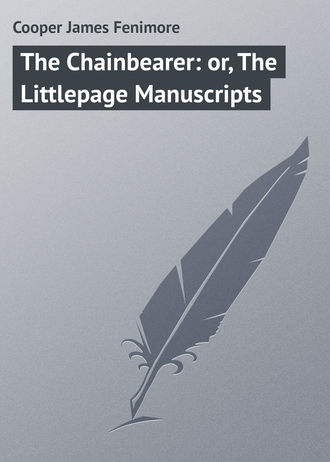
Полная версия
The Chainbearer: or, The Littlepage Manuscripts
Revolutions, more especially such as are of a popular character, are not remarkable for bringing forward those who are highly educated, or otherwise fitted for their new stations, unless it may be on the score of zeal. It is true, service generally classes men, bringing out their qualities, and necessity soon compels the preferment of those who are the best qualified. Our own great national struggle, however, probably did less of this than any similar event of modern times, a respectable mediocrity having accordingly obtained an elevation that, as a rule, it was enabled to keep to the close of the war. It is a singular fact that not a solitary instance is to be found in our military annals of a young soldier's rising to high command, by the force of his talents, in all that struggle. This may have been, and in a measure probably was owing to the opinions of the people, and to the circumstance that the service itself was one that demanded greater prudence and circumspection than qualities of a more dazzling nature; or the qualifications of age and experience, rather than those of youth and enterprise. It is probable Andries Coejemans, on the score of original station, was rather above than below the level of the social positions of a majority of the subalterns of the different lines of the more northern colonies, when he first joined the army. It is true, his education was not equal to his birth; for, in that day, except in isolated instances and particular families, the Dutch of New York, even in cases in which money was not wanting, were any thing but scholars. In this particular, our neighbors the Yankees had greatly the advantage of us. They sent everybody to school, and, though their educations were principally those of smatterers, it is an advantage to be even a smatterer among the very ignorant. Andries had been no student either, and one may easily imagine what indifferent cultivation will effect on a naturally thin soil. He could read and write, it is true, but it was the ciphering under which he broke down, as a surveyor. I have often heard him say, that "if land could be measured without figures, he would turn his back on no man in the calling in all America, unless it might be 'His Excellency,' who, he made no doubt, was not only the best, but the honestest surveyor mankind had ever enjoyed."
The circumstance that Washington had practised the art of a surveyor for a short time in his early youth, was a source of great exultation with Andries Coejemans. He felt that it was an honor to be even a subordinate in a pursuit, in which such a man was a principal. I remember, that long after we were at Saratoga together, Captain Coejemans, while we were before Yorktown, pointed to the commander-in-chief one day, as the latter rode past our encampment, and cried out with emphasis – "T'ere, Mortaunt, my poy – t'ere goes His Excellency! – It would be t'e happiest tay of my life, coult I only carry chain while he survey't a pit of a farm, in this neighborhoot."
Andries was more or less Dutch in his dialect, as he was more or less interested. In general, he spoke English pretty well – colony English I mean, not that of the schools; though he had not a single Yankeeism in his vocabulary. On this last point he prided himself greatly, feeling an honest pride, if he did occasionally use vulgarisms, a vicious pronounciation, or make a mistake in the meaning of a word, a sin he was a little apt to commit; and that his faults were all honest New York mistakes and no "New England gipperish." In the course of the various visits I paid to the camp, Andries and myself became quite intimate, his peculiarities seizing my fancy; and doubtless, my obvious admiration awakening his gratitude. In the course of our many conversations, he gave me his whole history, commencing with the emigration of the Coejemans from Holland, and ending with our actual situation, in the camp at Saratoga. Andries had been often engaged, and, before the war terminated, I could boast of having been at his side in no less than six affairs myself, viz.. White Plains, Trenton, Princeton, Bhemis's Heights, Monmouth, and Brandywine; for I had stolen away from college to be present at the last affair. The circumstance that our regiment was both with Washington and Gates, was owing to the noble qualities of the former, who sent off some of his best troops to reinforce his rival, as things gathered to a head at the North. Then I was present throughout, at the siege of Yorktown. But it is not my intention to enlarge on my own military services.
While at Saratoga, I was much struck with the air, position and deportment of a gentleman who appeared to command the respect, and to obtain the ears of all the leaders in the American camp, while he held no apparent official station. He wore no uniform, though he was addressed by the title of general, and had much more of the character of a real soldier than Gates who commanded. He must have been between forty and fifty at that time, and in the full enjoyment of the vigor of his mind and body. This was Philip Schuyler, so justly celebrated in our annals for his wisdom, patriotism, integrity, and public services. His connection with the great northern campaign is too well known to require any explanations here. Its success, perhaps, was more owing to his advice and preparations than to the influence of any one other mind, and he is beginning already to take a place in history, in connection with these great events, that has a singular resemblance to that he occupied during their actual occurrence: in other words, he is to be seen in the background of the great national picture, unobtrusive and modest, but directing and controlling all, by the power of his intellect, and the influence of his experience and character. Gates1 was but a secondary personage, in the real events of that memorable period. Schuyler was the presiding spirit, though forced by popular prejudice to retire from the apparent command of the army. Our written accounts ascribe the difficulty that worked this injustice to Schuyler, to a prejudice which existed among the eastern militia, and which is supposed to have had its origin in the disasters of St. Clair, or the reverses which attended the earlier movements of the campaign. My father, who had known General Schuyler in the war of '56, when he acted as Bradstreet's right-hand man, attributed the feeling to a different cause. According to his notion of the alienation, it was owing to the difference in habits and opinions which existed between Schuyler, as a New York gentleman, and the yeomen of New England, who came out in 1777, imbued with all the distinctive notions of their very peculiar state of society. There may have been prejudices on both sides, but it is easy to see which party exhibited most magnanimity and self-sacrifice. Possibly, the last was inseparable from the preponderance of numbers, it not being an easy thing to persuade masses of men that they can be wrong, and a single individual right. This is the great error of democracy, which fancies truth is to be proved by counting noses; while aristocracy commits the antagonist blunder of believing that excellence is inherited from male to male, and that too in the order of primogeniture! It is not easy to say where one is to look for truth in this life.
As for General Schuyler, I have thought my father was right in ascribing his unpopularity solely to the prejudices of provinces. The Muse of History is the most ambitious of the whole sisterhood, and never thinks she has done her duty unless all she says and records is said and recorded with an air of profound philosophy; whereas, more than half of the greatest events which affect human interest, are to be referred to causes that have little connection with our boasted intelligence, in any shape. Men feel far more than they reason, and a little feeling is very apt to upset a great deal of philosophy.
It has been said that I passed six years at Princeton; nominally, if not in fact; and that I graduated at nineteen. This happened the year Cornwallis surrendered, and I actually served at the siege as the youngest ensign in my father's battalion. I had also the happiness, for such it was to me, to be attached to the company of Captain Coejeman's, a circumstance which clinched the friendship I had formed for that singular old man. I say old, for by this time Andries was every hour of sixty-seven, though as hale, and hearty, and active, as any officer in the corps. As for hardships, forty years of training, most of which had been passed in the woods, placed him quite at our head, in the way of endurance.
I loved my predecessors, grandfather and grandmother included, not only as a matter of course, but with sincere filial attachment; and I loved Miss Mary Wallace, or aunt Mary, as I had been taught to call her, quite as much on account of her quiet, gentle, affectionate manner, as from habit; and I loved Major Dirck Follock as a sort of hereditary friend, as a distant relative, and a good and careful guardian of my own youth and inexperience on a thousand occasions; and I loved my father's negro man, Jaap, as we all love faithful slaves, however unnurtured they may be; but Andries was the man whom I loved without knowing why. He was illiterate almost to greatness, having the drollest notions imaginable of this earth and all it contained; was anything but refined in deportment, though hearty and frank; had prejudices so crammed into his moral system that there did not seem to be room for anything else; and was ever so little addicted, moreover, to that species of Dutch jollification, which had cost old Colonel Van Valkenburgh his life, and a love for which was a good deal spread throughout the colony. Nevertheless, I really loved this man, and when we were all disbanded at the peace, or in 1783, by which time I had myself risen to the rank of captain, I actually parted from old Andries with tears in my eyes. My grandfather, General Littlepage, was then dead, but government giving to most of us a step, by means of brevet rank, at the final breaking up of the army, my father, who had been the full colonel of the regiment for the last year, bore the title of brigadier for the remainder of his days. It was pretty much all he got for seven years of dangers and arduous services. But the country was poor, and we had fought more for principles than for the hope of rewards. It must be admitted that America ought to be full of philosophy, inasmuch as so much of her system of rewards and even of punishments, is purely theoretical, and addressed to the imagination, or to the qualities of the mind. Thus it is that we contend with all our enemies on very unequal grounds. The Englishman has his knighthood, his baronetcies, his peerages, his orders, his higher ranks in the professions, his batons, and all the other venial inducements of our corrupt nature to make him fight, while the American is goaded on to glory by the abstract considerations of virtue and patriotism. After all, we flog quite as often as we are flogged, which is the main interest affected. While on this subject I will remark that Andries Coejemans never assumed the empty title of major, which was so graciously bestowed on him by the Congress of 1783, but left the army a captain in name, without half-pay or anything but his military lot, to find a niece whom he was bringing up, and to pursue his old business of a "chainbearer."
CHAPTER II
"A trusty villain, sir; that very oft,When I am dull with care and melancholy,Lightens my humors with his many jests."– Dromio of Syracuse.It will be seen that, while I got a degree, and what is called an education, the latter was obtained by studies of a very desultory character. There is no question that learning of all sorts fell off sadly among us during the revolution and the twenty years that succeeded it. While colonies, we possessed many excellent instructors who came from Europe; but the supply ceased, in a great measure, as soon as the troubles commenced; nor was it immediately renewed at the peace. I think it will be admitted that the gentlemen of the country began to be less well educated about the time I was sent to college, than had been the case for the previous half-century, and that the defect has not yet been repaired. What the country may do in the first half of the nineteenth century remains to be seen.2
My connection with the army aided materially in weaning me from home, though few youths had as many temptations to return to the paternal roof as myself. There were my beloved mother and my grandmother, in the first place, both of whom doted on me as on an only son. Then aunt Mary almost equally shared in my affections. But I had two sisters, one of whom was older, and the other younger than myself. The eldest, who was called Anneke, after our dear mother, was even six years my senior, and was married early in the war to a gentleman of the name of Kettletas. Mr. Kettletas was a person of very good estate, and made my sister perfectly happy. They had several children, and resided in Dutchess, which was an additional reason for my mother's choosing that county for her temporary residence. I regarded Anneke, or Mrs. Kettletas, much as all youths regard an elder sister, who is affectionate, feminine and respectable; but little Katrinke, or Kate, was my pet. She again, was four years younger than myself; and as I was just two-and-twenty when the army was disbanded, she of course was only eighteen. This dear sister was a little, jumping, laughing, never-quiet, merry thing, when I had taken my leave of her, in 1781, to join the regiment as an ensign, as handsome and sweet as a rose-bud, and quite as full of promise. I remember that old Andries and I used to pass much of our time in camp in conversing about our several pets; he of his niece, and I of my younger sister. Of course, I never intended to marry, but Kate and I were to live together; she as my housekeeper and companion, and I as her elder brother and protector. The one great good of life with us all was peace, with independence; which obtained, no one, in our regiment at least, was so little of a patriot as to doubt of the future. It was laughable to see with how much gusto and simplicity the old Chainbearer entered into all these boyish schemes. His niece was an orphan, it would seem, the only child of an only but a half-sister, and was absolutely dependent on him for the bread she put into her mouth. It is true that this niece fared somewhat better than such a support would seem to promise, having been much cared for by a female friend of her mother's, who, being reduced herself, kept a school, and had thus bestowed on her ward a far better education than she could ever have got under her uncle's supervision, had the last possessed the riches of the Van Rensselaers, or of the Van Cortlandts. As has been substantially stated, old Andries's forte did not lie in education, and they who do not enjoy the blessings of such a character, seldom duly appreciate their advantages. It is with the acquisitions of the mind, as with those of mere deportment and tastes; we are apt to undervalue them all, until made familiarly acquainted with their power to elevate and to enlarge. But the niece of Andries had been particularly fortunate in falling into the hands she had; Mrs. Stratton having the means and the inclination to do all for her, in the way of instruction, that was then done for any young woman in New York, as long as she lived. The death of this kind friend occurring, however, in 1783, Andries was obliged to resume the care of his niece, who was now thrown entirely on himself for support. It is true, the girl wished to do something for herself, but this neither the pride nor the affection of the old chainbearer would listen to.
"What can the gal do?" Andries said to me significantly, one day that he was recounting all these particulars. "She can't carry chain, though I do believe, Morty, the chilt has head enough, and figures enough to survey! It would do your heart good to read the account of her l'arnin' t'at t'e olt woman used to send me; though she wrote so excellent a hant herself, t'at it commonly took me a week to read one of her letters; that is, from 'Respected Friend' to 'Humble Sarvent,' as you know them 'ere t'ings go."
"Excellent hand! Why, I should think, Andries, the better the hand, the easier one could read a letter."
"All a mistake. When a man writes a scrawl himself, it's nat'ral he shoult read scrawls easiest, in his own case. Now, Mrs. Stratton was home-taught, and would be likely to get into ways t'at a plain man might find difficult to get along wit'."
"Do you think, then, of making a surveyor of your niece?" I asked, a little pointedly.
"Why, she is hartly strong enough to travel t'rough the woots, and, the callin' is not suitaple to her sex, t'ough I woult risk her against t'e oldest calculator in t'e province."
"We call New York a State, now, Captain Andries, you will recollect."
"Ay, t'at's true, and I peg the State's pardon. Well, t'ere'll be scrambling enough for t'e land, as soon as the war is fairly over, and chainbearing will be a sarviceable callin' once more. Do you know, Morty, they talk of gifin' all of our line a quantity of land, privates and officers, which will make me a landholter again, the very character in which I started in life. You will inherit acres enough, and may not care so much apout owning a few huntret, more or less, but I own the idee is agreeaple enough to me."
"Do you propose to commence anew as a husbandman?"
"Not I; the pusiness never agreet wit' me, nor I wit' it. Put a man may survey his own lot, I suppose, and no offence to greater scholars. If I get t'e grant t'ey speak of, I shall set to work and run it out on my own account, and t'en we shall see who understants figures, and who don't! If other people won't trust me, it is no reason I shoult not trust myself."
I knew that his having broken down in the more intellectual part of his calling was a sore point with old Andries, and I avoided dwelling on this part of the subject. In order to divert his mind to other objects, indeed, I began to question him a little more closely than I had ever done before, on the subject of his niece, in consequence of which expedient I now learned many things that were new to me.
The name of the chainbearer's niece was Duss Malbone, or so he always pronounced it. In the end I discovered that Duss was a sort of Dutch diminutive for Ursula. Ursula Malbone had none of the Coejemans blood in her, notwithstanding she was Andries's sister's daughter. It seemed that old Mrs. Coejemans was twice married, her second husband being the father of Duss's mother. Bob Malbone, as the chainbearer always called the girl's father, was an eastern man of very good family, but was a reckless spendthrift, who married Duss the senior, as well as I could learn, for her property; all of which, as well as that he had inherited himself, was cleverly gotten rid of within the first ten years of their union, and a year or two after the girl was born. Both father and mother died within a few months of each other, and in a very happy moment as regards worldly means, leaving poor little Duss with no one to care for her but her half-uncle, who was then living in the forest in his regular pursuits, and the Mrs. Stratton I have mentioned. There was a half-brother, Bob Malbone having married twice, but he was in the army, and had some near female relation to support out of his pay. Between the chainbearer and Mrs. Stratton, with an occasional offering from the brother, the means of clothing, nourishing and educating the young woman had been found until she reached her eighteenth year, when the death of her female protector threw her nearly altogether on the care of her uncle. The brother now did his share, Andries admitted; but it was not much that he could do. A captain himself, his scanty pay barely sufficed to meet his own wants.
I could easily see that old Andries loved Duss better than anything else or any other person. When he was a little mellow, and that was usually the extent of his debaucheries, he would prate about her to me until the tears came into his eyes, and once he actually proposed that I should marry her.
"You woult just suit each other," the old man added, in a very quaint, but earnest manner, on that memorable occasion; "and as for property, I know you care little for money, and will have enough for half-a-tozen. I swear to you, Captain Littlepage" – for this dialogue took place only a few months before we were disbanded, and after I had obtained a company – "I swear to you, Captain Littlepage, t'e girl is laughing from morning till night, and would make one of the merriest companions for an olt soldier that ever promiset to 'honor and obey.' Try her once, lad, and see if I teceive you."
"That may do well enough, friend Andries, for an old soldier, whereas you will remember I am but a boy in years – "
"Ay, in years; but olt as a soldier, Morty – olt as White Plains, or '76; as I know from hafin seen you unter fire."
"Well, be it so; but it is the man, and not the soldier, who is to do the marrying, and I am still a very young man."
"You might do worse, take my word for it, Mortaunt, my dear poy; for Duss is fun itself, and I have often spoken of you to her in a way t'at will make the courtship as easy as carrying a chain on t'e Jarmen Flats."
I assured my friend Andries that I did not think of a wife yet, and that my taste ran for a sentimental and melancholy young woman, rather than for a laughing girl. The old chainbearer took this repulse good-humoredly, though he renewed the attack at least a dozen times before the regiment was disbanded, and we finally separated. I say finally separated, though it was in reference to our companionship as soldiers, rather than as to our future lives; for I had determined to give Andries employment myself, should nothing better offer in his behalf.
Nor was I altogether without the means of thus serving a friend, when the inclination existed. My grandfather, Herman Mordaunt, had left me, to come into possession at the age of twenty-one, a considerable estate in what is now Washington County, a portion of our territory that lies northeast from Albany, and at no great distance from the Hampshire Grants. This property, of many thousands of acres in extent, had been partially settled under leases by himself, previously to my birth, and those leases having mostly expired, the tenants were remaining at will, waiting for more quiet times to renew their engagements. As yet Ravensnest, for so the estate was called, had given the family little besides expense and trouble; but the land being good, and the improvements considerable, it was time to look for some return for all our outlays. This estate was now mine in fee, my father having formally relinquished its possession in my favor the day I attained my majority. Adjacent to this estate lay that of Mooseridge, which was the joint property of my father and of his friend Major – or as he was styled in virtue of the brevet rank granted at the peace —Colonel Follock. Mooseridge had been originally patented by my grandfather, the first General Littlepage, and old Colonel Follock, he who had been slain and scalped early in the war; but on the descent of his moiety of the tenantry in common to Dirck Follock, my grandfather conveyed his interest to his own son, who ere long must become its owner, agreeably to the laws of nature. This property had once been surveyed into large lots, but owing to some adverse circumstances, and the approach of the troubles, it had never been settled or surveyed into farms. All that its owners ever got for it, therefore, was the privilege of paying the crown its quit-rents; taxes, or reserved payments, of no great amount, it is true, though far more than the estate had ever yet returned.
While on the subject of lands and tenements, I may as well finish my opening explanations. My paternal grandfather was by no means as rich as my father, though the senior, and of so much higher military rank. His property, or neck, of Satanstoe, nevertheless, was quite valuable; more for the quality of the land and its position than for its extent. In addition to this, he had a few thousand pounds at interest; stocks, banks, and moneyed corporations of all kinds being then nearly unknown among us. His means were sufficient for his wants, however, and it was a joyful day when he found himself enabled to take possession of his own house again, in consequence of Sir Guy Carleton's calling in all of his detachments from Westchester. The Morrises, distinguished whigs as they were, did not get back to Morrisania until after the evacuation, which took place November 25, 1783; nor did my father return to Lilacsbush until after that important event. The very year my grandfather saw Satanstoe, he took the small-pox in camp and died.











